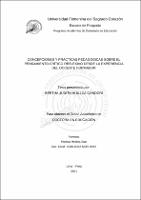Concepciones y prácticas pedagógicas sobre el pensamiento crítico reflexivo desde la experiencia del docente formador

Acceso embargado
Embargado hasta 2024-10-16
Embargado hasta 2024-10-16
Date
2021Author
Huillca Condori, Bertha Judith
Metadata
Show full item recordAbstract
El pensamiento del docente es un eje fundamental en la configuración y complejidad de la praxis educativa y está determinado por un sistema de construcción socio cultural y experiencial permanente. A partir de ello, el objetivo de esta investigación es comprender las concepciones y prácticas pedagógicas sobre el pensamiento crítico reflexivo (PCR) desde la voz del docente formador y en el contexto de una Escuela de Educación Superior Pedagógica Pública de Lima. Se realizó un estudio de caso de tipo intrínseco y la muestra estuvo conformada por 6 docentes formadores seleccionados bajo criterios de heterogeneidad socio-estructural, a quienes se les administró una entrevista. El análisis del contenido incluye métodos de hermenéutica artesanal con rigurosos procesos de triangulación y codificación que fueron complementados con la aplicación del software Atlas.ti en su versión 9. Se identificaron categorías emergentes que disponen las concepciones sobre el PCR, hacia una tendencia cognitivista de orientación teórica e instrumental. Ello es específico en los procesos de lectura e investigación; aunque no se desdice el aspecto actitudinal como un dispositivo relevante de este proceso. La práctica pedagógica fue asociada a una formación profesional especializada con dominio de la teoría educativa y un rol formativo de enfoque socio constructivista. Sin embargo, se reconoce que en la misma es indispensable la capacidad reflexiva e intersubjetiva del docente y su disposición al trabajo colegiado, como mecanismos que le permitirán afrontar eficazmente los desafíos de una nueva normalidad dinámica y cambiante. The teacher's thinking is a fundamental axis in the configuration and complexity
of educational praxis and is determined by a system of permanent socio-cultural
and experiential construction. Based on this, the objective of this research is to
understand the conceptions and pedagogical practices on critical reflective
thinking (CRP) from the voice of the teacher trainer and in the context of a School
of Higher Public Pedagogical Education in Lima. An intrinsic case study was
carried out and the sample consisted of 6 teacher trainers selected under criteria
of socio-structural heterogeneity, who were interviewed. The content analysis
included handmade hermeneutic methods with rigorous triangulation and
codification processes that were complemented with the application of Atlas.ti
software in its version 9. Emerging categories were identified that arrange the
conceptions on RCP, towards a cognitivist tendency of theoretical and
instrumental orientation. This is specific in the reading and research processes,
although the attitudinal aspect is not disregarded as a relevant device in this
process. The pedagogical practice was associated with a specialized
professional training with mastery of educational theory and a formative role with
a socio-constructivist approach. However, it is recognized that the reflective and
inter-subjective capacity of the teacher and his/her disposition to collegial work
are indispensable in this practice, as mechanisms that will allow him/her to
effectively face the challenges of a new dynamic and changing normality.
Description
Tesis

